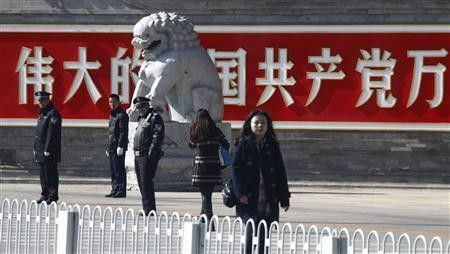Beijing says jasmine protest calls doomed to fail

Calls for Jasmine Revolution protests in Beijing are doomed to fail as people want peace and stability and government policies are popular, a spokeswoman for the city's government said on Sunday.
Chinese police have rounded up dozens of dissidents since online messages from abroad urged pro-democracy gatherings inspired by the Jasmine Revolution in Tunisia, and have banned foreign reporters from sites of would-be protests in Beijing.
Cool-headed people know that these people have chosen the wrong place, and their ideas and plans are wrong, city government spokeswoman Wang Hui said of those calling for protests. In Beijing we have had and will have no such incidents.
Over the past 30 years or more China's success and economic progress has been broadly recognized. The Communist Party's leadership and government's policies are in line with the people's will and their hearts, she told reporters.
Defending one-party control has been a priority since the pro-democracy demonstrations of 1989, but analysts expect official anxieties about social stability to multiply as President Hu Jintao prepares to hand power to a successor from late 2012.
Beijing has imposed tighter censorship, intense security and new restrictions on foreign reporters, some of whom were beaten and kicked by plainclothes security officers while at the site of one of the proposed protest gatherings last weekend.
There was a heavy police presence on Sunday in parts of Beijing and Shanghai for which protests had been called, but no obvious sign of any protesters.
PUBLIC SECURITY BUDGET RISES
Police smothered last weekend's planned protest sites before any gatherings had a chance of forming, and dozens of dissidents, human rights activists and critics of the government are in detention or house arrest. Internet censorship also means that few Chinese residents are aware of the protest calls.
The official alarm over the protest calls has overlapped with the convening of the annual national parliamentary session in the capital, which draws intense security even in normal times.
Chinese police have said that reporting from the phantom protest sites in Beijing and Shanghai without prior authorization is illegal, and threatened to revoke the visas of foreign journalists who try to do so.
Wang repeated the government's line that reporters in busy parts of Beijing needed permission first before reporting there, and called on foreign journalists not to create news and to respect all Chinese laws.
Those who want to find in China news along the lines of what has happened in the Middle East and North Africa will come up empty handed, she added.
Beijing has mobilized 739,000 police officers, officials, security guards and residents recruited into local patrols to guard against mishaps during the parliament, the official China News Service reported this week.
On Saturday, China's Finance Ministry unveiled to the parliament a 13.8 percent jump in the national public security budget compared to 2010, pushing spending on law and order items to 624.4 billion yuan ($95.0 billion) -- higher than the official military budget, which rose 12.7 percent to 601.1 billion yuan.
© Copyright Thomson Reuters 2024. All rights reserved.





















